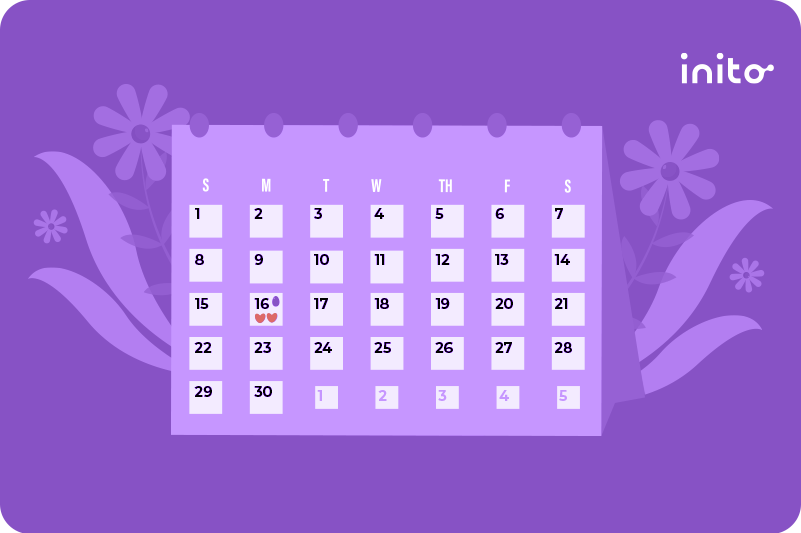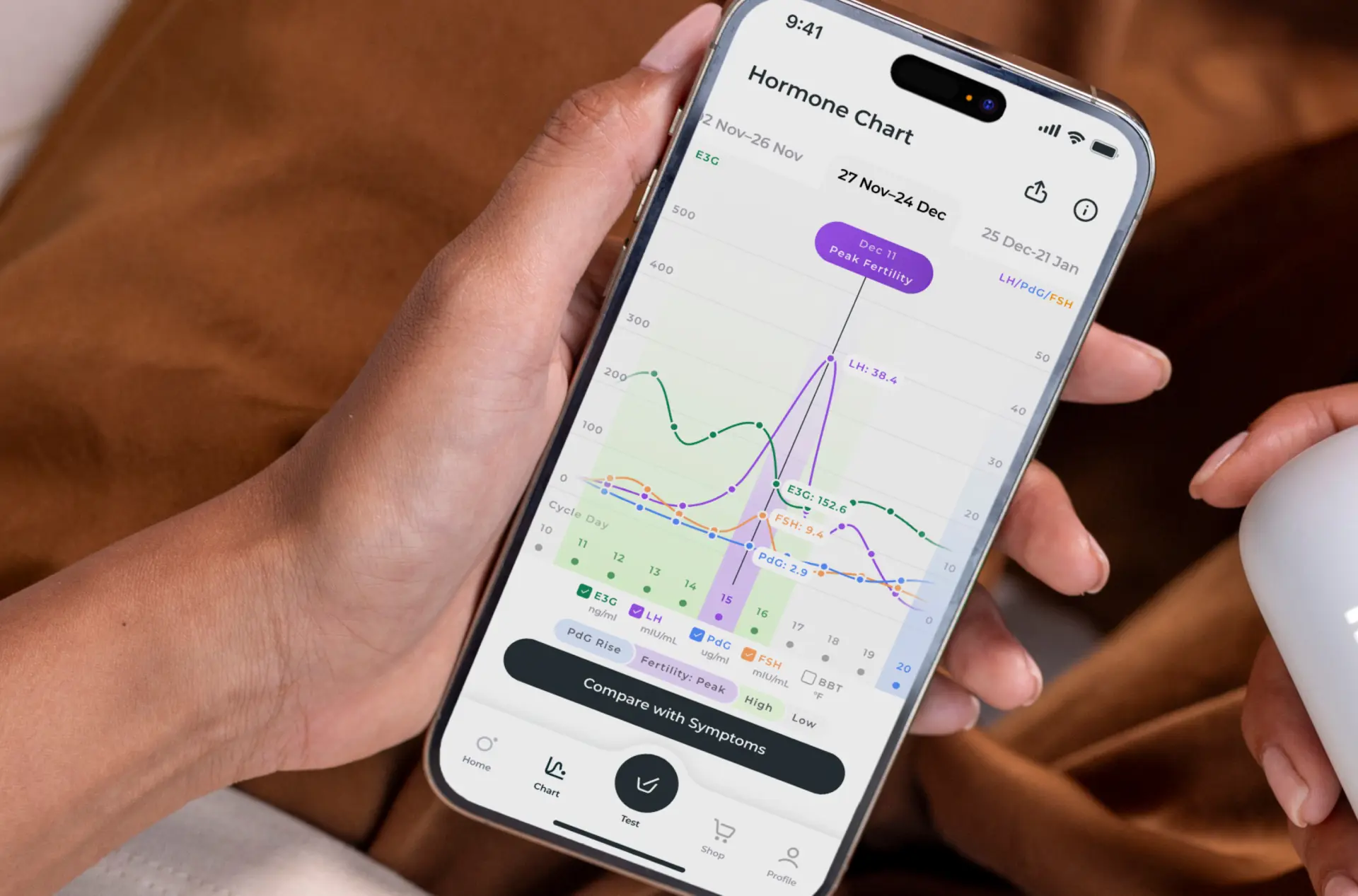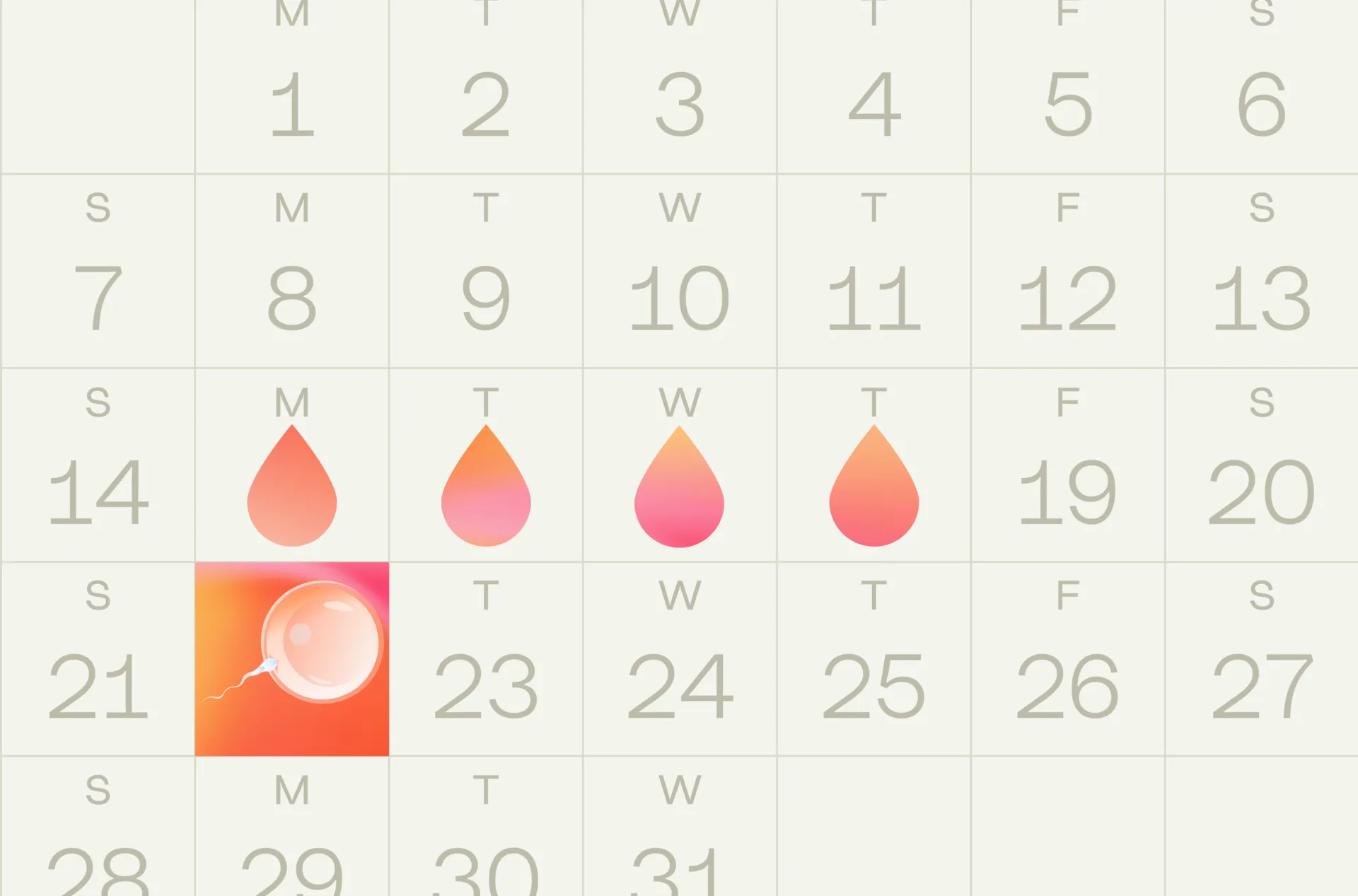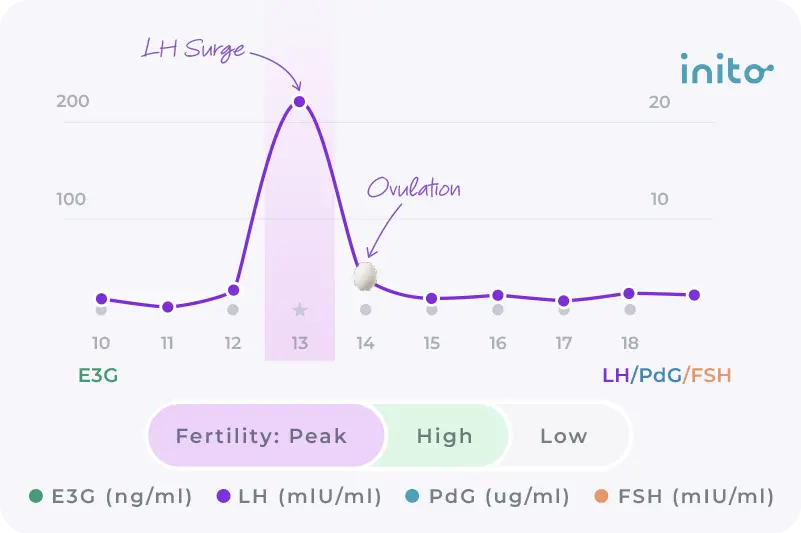Content table
Are you trying to get pregnant? Then you are in the right place.
You already know that the timing of getting busy in the bedroom is important. And, chances are you’ve heard rumors about how many times a day you should be having sex during your ovulation.
So, are these rumors true?
Today we are here to chat further about whether having sex twice a day during ovulation actually increases your chances of getting pregnant.
Key Takeaways
- Timing is crucial to getting pregnant.
- The fertile window lasts for 6 days: 4 days before ovulation, the day of ovulation, and one day after ovulation.
- The day before ovulation offers the highest chances of conception. This is because sperm can survive in the female body for up to 5 days, while the egg lives only for 12-24 hours after ovulation.
- You can track ovulation using symptoms like increased sex drive, changes in cervical mucus, basal body temperature, and cervical position, or more accurately by using ovulation predictor kits (OPKs) and fertility monitors.
- Having too much sex during the peri-implantation window can make it harder to get pregnant.
- Steering clear of sex for 2+ days can boost semen volume and sperm count for the guys. But it can also lead to immature sperm and more sperm that are likely to have DNA damage.
- Studies show that how often you have sex doesn’t make a big difference when it comes to TTC.
- You can try improving your chances of getting pregnant by staying away from cigarettes, limiting how much alcohol and caffeine you drink, keeping a healthy weight, exercising moderately, getting enough sleep, and reducing your stress levels.
- If you’ve been TTC for a year without any luck (or 6 months if you’re 35+), then you want to talk to a doctor and see if there are potential fertility issues.
A Recap of Your Cycle
Before we get to the pregnancy part, let’s start with a recap of your menstrual cycle.
It kicks off with your period, signaling the follicular phase. FSH rises, causing the ovarian follicles to grow, and one of these matures into the dominant follicle which releases estrogen.
This boost in estrogen marks the beginning of your fertile window, prompting the pituitary gland to start producing LH. A surge in LH tells your dominant follicle that it’s time to rupture, which triggers ovulation, or the release of the egg. Ovulation enters the scene approximately 8-20 hours after your LH levels surge.
Post-ovulation, the corpus luteum produces progesterone and preps for implantation. If the egg is fertilized and implantation happens, the corpus luteum continues to produce progesterone. However, if the egg is unfertilized, the corpus luteum disintegrates, dropping progesterone and estrogen levels, leading to your period.
And the cycle starts all over again.
Know your chances of Ovulation!
Take our ovulation quiz to understand how your hormone patterns and
lifestyle factors may affect your chances of ovulating
A Dive Into Ovulation and Your Fertile Window
Knowing when you’re ovulating is very important because this is the time that you are most fertile, a.k.a. your fertile window.
Your 6-day fertile window consists of:
- 4 days before ovulation
- The day of ovulation
- 1 day after ovulation
This is when you want to get busy in bed with your partner because you are most likely to get pregnant during this time.
A study uncovered the likelihood of pregnancy at different times around ovulation:
Cycle Day | Likelihood of Pregnancy |
|---|---|
4 days before ovulation | 18% |
3 days before ovulation | 27% |
2 days before ovulation | 33% |
1 day before ovulation | 42% |
Ovulation day | 20% |
1 day after ovulation | 8% |
So, as you can see, your best chances of getting pregnant are the day before ovulation and not actually on ovulation day itself.
Surprised? You’re not alone. Many people don’t know this and are probably wondering how this is the case.
Well, it’s because the sperm can live for approximately 5 days in the female reproductive tract. An egg, however, can only live for 12-24 hours after ovulation. So, to keep the chances of fertilization high, it’s better to have the sperm already sitting there waiting for the egg when it’s released, which means having sex before ovulation.
See how your hormone chart might look like!
Answer some questions to help us provide you a free personalized hormone chart customized to your hormonal health and conditions
How Often Should You Have Sex to Conceive?
Now you may be wondering how many times to have sex during your fertile window. This is a very common question.
According to the ACOG, having sex every day or every other day in the fertile window maximizes your chances of conception.
But will having sex multiple times a day during that period make your chances higher?
Let’s find out.
Read More: Is Having Sex Everyday Bad When Trying to Conceive?
Should You Have Sex Twice a Day During Ovulation?
When it comes to getting busy during your fertile window, you may be thinking, “the more the merrier.” But that’s not the case.
You can slow down your hard work in the bedroom because science shows that how often you should be having sex isn’t as important as when you should be having sex.
As long as you’re having sex every day or every other day in your fertile window, you should be good to go. You don’t need to have sex multiple times a day to boost your chances of conception.
How Much Sex Is Too Much?
On the flip side, is there such a thing as too much sex when you’re trying to conceive?
Studies don’t point to really conclusive results – some say “yes,” while others say “no.”
Let’s take a look at both sides of the coin, for both men and women to figure out whether having more sex increases your chances of pregnancy.
Females
When it comes to women, one study showed that the more sex a woman has, the better it prepares her immune system to accept sperm. Our bodies have antibodies called IgA that typically see sperm as a foreign body, and attack it, thus killing it.
But, this study shows that the more the woman introduces this “foreign body” (sperm) into her body via intercourse, the more her body will understand that it is not something to attack.
Another study backs up the above claim by saying that having frequent sex actually affects your hormones and immune system to increase your chances of conception.
This is thanks to a theory that there is a “secret handshake” (cute, isn’t it?) between sperm and the cells of a woman’s uterus that allows certain sperm to pass by without triggering the woman’s immune response to attack and kill.
Other studies have shown that frequent sex can reduce cortisol levels and increase your chances of having a more regular cycle – both things we all would love to have, right?
But then, the idea of “more is better” comes to a screeching halt with a study that shows having sex around the time implantation occurs can actually mess with implantation – and that is something we do not want.
This study found that couples who had sex two or more days during this window were 40% less likely to successfully conceive than couples who didn’t.
In short, the more sex during the peri-implantation window, the lower the chances of pregnancy.
You may want to be better safe than sorry and steer clear of having too much sex around your peri-implantation window.
Males
Now, for the guys.
Studies show that going two or more days without sex leads to greater semen volume and sperm count. Yay! We like that.
However, it’s not as simple as that. The same study also found that abstaining from sex for 2 or more days can also lead to more immature sperm and greater sperm DNA damage, which means lower sperm quality.
Another study agrees and says that there is a mixed impact on the sperm when it comes to abstinence. It found that the longer the period of abstinence, the higher the semen volume and sperm count. But, the effect of that abstinence on motility, morphology, DNA fragmentation rate, and viability was inconclusive.
One small study found that a short period of abstinence followed by daily sex in the fertile window was the prime time to get the greatest number of sperm and, thus, increased chances of conception.
Quality over quantity
A New England Journal of Medicine study found that couples who had sex every day had a 25% chance of conceiving, while those who had sex every other day had a 22% chance of conceiving.
But that’s not a big enough difference between the two to really worry about.
If you’re trying to have sex multiple times a day during ovulation like it’s your job, then that kind of takes the fun out of it, no?
If you’re doing it because you want to and you enjoy having sex multiple times a day, then go for it!
But if you think having sex multiple times a day will increase your chances of getting pregnant, the science just isn’t there to back you up on that.
In fact, if you’re making sex feel like a job, then that can lead to monotony, burnout, and stress, which may actually end up leaving you wanting less. And that’s not what you want if you’re trying to get pregnant.
So keep it fun, and once a day during your fertile window is probably enough.
How Long Does It Take To Get Pregnant?
So, how long do you need to be on your sex regimen before you get pregnant?
That varies from couple to couple.
But a study created some average times you can go off of.
- 45% of couples get pregnant after unprotected intercourse within 3 menstrual cycles
- 65% within 6 cycles
- 85% within 12 cycles
These numbers are just averages, but give you a good idea of how long it may take to get pregnant.
How to Improve Your Chances of Getting Pregnant?
If you’re trying to get pregnant, you want to make your chances as high as possible right? And if you’ve been TTC and have been running into some struggles, you’re probably looking for ways to boost your chances, too.
Here are the top ways to improve your chances of pregnancy.
Track your fertile window
Timing is everything, right? The best way to know your fertile window is by tracking your hormones.
OPKs do an okay job of telling you when you’re ovulating if you have normal cycles and no hormone imbalances. But remember, they are not accurate for women whose hormone levels fall outside of the threshold values and also for women who have irregular cycles.
That’s where Inito comes in. It is the only fertility monitor that tracks FSH, LH, and estrogen to track your fertile window, and PdG (urine metabolite of progesterone) to confirm when you’re ovulating. Even better? It does all this in one quick, easy test strip.
Time your sex
Tracking your ovulation will let you know when to get busy in the bedroom. A quick refresh: your fertile window is 4 days before ovulation, the day of ovulation, and one day after ovulation.
And the best time to have sex if your TTC is the day before ovulation so the sperm is sitting there ready and waiting for the egg to release.
Live a healthy lifestyle
There are ways to improve your chances of getting pregnant outside of the bedroom, too. And one of those is your lifestyle.
Avoid smoking entirely – this is never good for you and especially not if you’re TTC.
Alcohol is also something you want to avoid. You may think a little bit won’t hurt, but the CDC says to steer clear.
You probably won’t like this one, but caffeine is something you also want to be careful of if you’re trying to get pregnant. Thankfully you don’t have to cut it out completely, but you want to limit it to no more than 200-300 mg/day.
Maintain a healthy weight
Weight plays an important role in setting your body up for a healthy conception, so you want to keep your BMI at a good place.
This means that your BMI should be between 18.5 and 24.9.
You can run into some issues if your weight goes above or below this.
If your BMI is over 25, you’ve got more body fat, which can jack up estrogen levels. This may mess with your cycle and make it hard to get pregnant.
On the flip side, if your BMI is under 18.5, there’s not enough fat to keep estrogen flowing right. This can also cause your cycles to get wonky and lead to fertility struggles.
Exercise moderately
You want to exercise, but not too much to increase your chances of getting pregnant.
So, what is the sweet spot?
Aim for 30-60 minutes of strenuous activity a day. Anything beyond that and you increase your risk of anovulatory cycles.
Some good examples of exercise include:
- Cycling
- Yoga
- Hiking
- Pilates
- Swimming
- Brisk walking
- Doubles tennis
Get enough sleep
Sleep is key to health in all areas of your life, including conception. You need to get enough sleep in order to keep your hormones happy and healthy.
Sleep deprivation can cause issues with your hormones, which has a domino effect on your attempts to conceive.
Aim for 7-8 hours of sleep a night (and no, that isn’t including the amount of time you spend lying in bed scrolling on your phone).
Reduce stress
As we shared above, high cortisol levels can lead to low progesterone levels, and progesterone is key to getting pregnant.
So, put some time and effort into reducing your stress – including the stress you’re putting on yourself to get pregnant!
If you’ve been following all of the above and have been trying to have a baby for a year without any luck (or 6 months if you’re 35 or older), then it’s time to consult a doctor to see if there’s something going on.

FAQs
Yes, while rare, getting pregnant twice during ovulation is possible. This is known as superfetation. This happens when you ovulate more than once during the menstrual cycle. The sperm then goes on to fertilize each egg.
Yes, having sex twice during ovulation is enough. While the frequency doesn’t matter as much, the timing does matter. As long as you have sex every day or every alternate day during your fertile window, you are good. The highest chances of conception are on the day before ovulation.
Yes, sex may feel different during ovulation. This is due to the rise in estrogen 3-4 days before ovulation which causes an increase in sex drive and cervical mucus. This helps in making penetration more comfortable and the sensations are more intense around ovulation. However, this is a subjective experience and may vary from person to person.
Yes, having sex twice a day can temporarily lower your sperm count. However, this is not something to be concerned about. While this is true for a single ejaculation, studies show that having sex often does not lower overall sperm count or fertility in men. The life cycle of sperm is 74 days which means that the body will naturally replenish sperm quickly.
Was this article helpful?
- Timing of Sexual Intercourse in Relation to Ovulation — Effects on the Probability of Conception, Survival of the Pregnancy, and Sex of the Baby | The New England Journal of Medicine
- Findings from a mobile application–based cohort are consistent with established knowledge of the menstrual cycle, fertile window, and conception | ASRM
- Trying to Get Pregnant? Here’s When to Have Sex. | ACOG
- Timing intercourse to achieve pregnancy: current evidence | NIH
- Interaction of menstrual cycle phase and sexual activity predicts mucosal and systemic humoral immunity in healthy women | NIH
- Sexual activity modulates shifts in Th1/Th2 cytokine profile across the menstrual cycle: An observational study | NIH
- The female reproductive tract contains multiple innate sialic acid-binding immunoglobulin-like lectins (Siglecs) that facilitate sperm survival | JBC
- The Menstrual Cycle and Sexual Behavior: Relationship to Eating, Exercise, Sleep, and Health Patterns | Taylor & Francis Online
- Sexual behavior frequency and menstrual cycle length in mature premenopausal women | ScienceDirect
- Peri-implantation intercourse lowers fecundability | ASRM
- Influence of the abstinence period on human sperm quality: analysis of 2,458 semen samples | NIH
- The impact of ejaculatory abstinence on semen analysis parameters: a systematic review | NIH
- Analysis of semen parameters during 2 weeks of daily ejaculation: a first in humans study | NIH
- Fecundity in couples trying to conceive naturally – the standard of reference for fertility treatments | Oxford Academic
- Alcohol and Pregnancy. Why take the risk? | CDC
- Is It Safe To Have Caffeine While Trying To Conceive? | Inito
- Moderate Caffeine Consumption During Pregnancy | ACOG
- Calculate Your Body Mass Index | NIH
- Obesity and anovulatory infertility: A review | NIH
- Effect of Exercise on Ovulation: A Systematic Review | Springer Link
- Sleep, Sleep Disturbance and Fertility in Women | NIH












